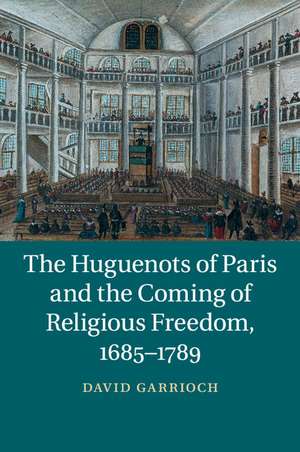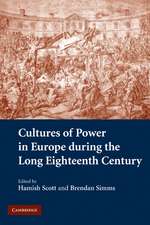The Huguenots of Paris and the Coming of Religious Freedom, 1685–1789
Autor David Garriochen Limba Engleză Paperback – 15 mar 2017
| Toate formatele și edițiile | Preț | Express |
|---|---|---|
| Paperback (1) | 286.30 lei 43-57 zile | |
| Cambridge University Press – 15 mar 2017 | 286.30 lei 43-57 zile | |
| Hardback (1) | 695.93 lei 43-57 zile | |
| Cambridge University Press – 12 feb 2014 | 695.93 lei 43-57 zile |
Preț: 286.30 lei
Nou
Puncte Express: 429
Preț estimativ în valută:
54.80€ • 56.47$ • 46.26£
54.80€ • 56.47$ • 46.26£
Carte tipărită la comandă
Livrare economică 03-17 martie
Preluare comenzi: 021 569.72.76
Specificații
ISBN-13: 9781107630963
ISBN-10: 1107630967
Pagini: 310
Ilustrații: 3 b/w illus. 4 maps 4 tables
Dimensiuni: 152 x 230 x 16 mm
Greutate: 0.42 kg
Editura: Cambridge University Press
Colecția Cambridge University Press
Locul publicării:New York, United States
ISBN-10: 1107630967
Pagini: 310
Ilustrații: 3 b/w illus. 4 maps 4 tables
Dimensiuni: 152 x 230 x 16 mm
Greutate: 0.42 kg
Editura: Cambridge University Press
Colecția Cambridge University Press
Locul publicării:New York, United States
Cuprins
Introduction; 1. The campaign against the Protestants; 2. Paris: 'ville de tolérance'; 3. Who were the Huguenots of Paris?; 4. Keeping the faith: family and religious culture; 5. Networks: the Protestants in the city; 6. Catholics and Protestants: hostility, indifference, and coexistence; 7. Growing acceptance; 8. Changing beliefs and religious cultures; 9. A non-confessional public domain; 10. Conclusion: the coming of religious freedom.
Recenzii
'David Garrioch's book on the Calvinist Parisians (Huguenots) from the Revocation of the Edict of Nantes to the eve of the French Revolution is a welcome one. In a clear and easy to read style, Garrioch brings us a much-needed study of Protestant Parisians in the eighteenth century … His study fills an important gap in the cultural history of Paris that traces the development of a diverse and tolerant city, a reflection of the economic and intellectual changes that marked the eighteenth century as a whole.' Xavier Marechaux, H-France
'Garrioch demonstrates his ability to connect the practices of everyday life to larger patterns of social and cultural transformation … By bringing together the various communities that shaped early modern Paris, he underscores the diversity of religious experience in Ancien Regime France and the continuing importance of religious sensibilities in the Age of Light.' Huguenot Society Journal
'Although the Huguenots are a central theme in the historiography of sixteenth - and seventeenth -century France, they tend to fade from view in studies of the eighteenth, appearing in a few dramatic episodes … Garrioch, an expert on eighteenth-century Paris, gives us a fuller picture. He shows how this banned minority managed to survive and eventually thrive in the capital, thanks to the rise of religious toleration over the course of the eighteenth century.' Charles Walton, The Journal of Modern History
'Garrioch demonstrates his ability to connect the practices of everyday life to larger patterns of social and cultural transformation … By bringing together the various communities that shaped early modern Paris, he underscores the diversity of religious experience in Ancien Regime France and the continuing importance of religious sensibilities in the Age of Light.' Huguenot Society Journal
'Although the Huguenots are a central theme in the historiography of sixteenth - and seventeenth -century France, they tend to fade from view in studies of the eighteenth, appearing in a few dramatic episodes … Garrioch, an expert on eighteenth-century Paris, gives us a fuller picture. He shows how this banned minority managed to survive and eventually thrive in the capital, thanks to the rise of religious toleration over the course of the eighteenth century.' Charles Walton, The Journal of Modern History
Notă biografică
Descriere
This book investigates the reasons why the Catholic population of Paris increasingly tolerated the minority Protestant Huguenot population between 1685 and 1789.



















